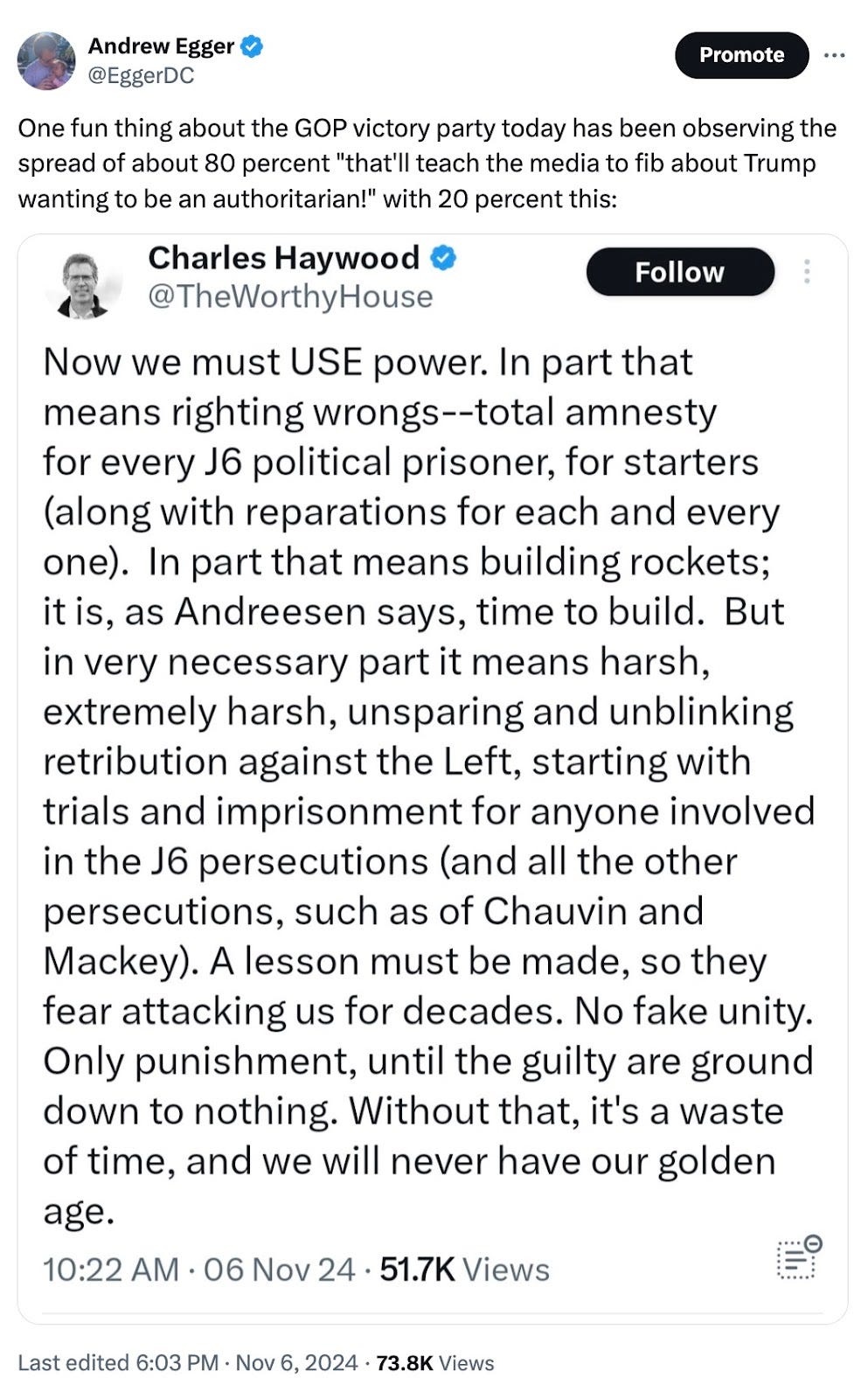No Honeymoon for Trumpism
Those opposed to the president-elect must start their work during his transition, not after he’s inaugurated.
The orderly transition begins, per Reuters:
Democratic U.S. President Joe Biden on Wednesday called to congratulate Donald Trump on his presidential election victory and invite him to meet at the White House and will address the nation on Thursday.
The White House, in a statement after Trump beat Democratic Vice President Kamala Harris for the U.S. presidency, said Biden also committed “to ensuring a smooth transition and emphasized the importance of working to bring the country together.”
Happy Thursday.

The Work Begins Now
by William Kristol
It was a defeat. It was a bad defeat.
There will be analyses. There will be explanations and ruminations, even recriminations and confabulations.
This effort is necessary and proper.
And there will be meetings. And panels. And conferences. Some of these will be interesting, some useful, some important.
There will also be a fair amount of wound-licking and navel-gazing. Most of this will be harmless.
If this reads as if I’m preemptively exasperated with some of this activity, don’t take me too seriously, or too literally. I am interested in much of this analysis, I expect to participate in some of it. It is, after all, important to understand the situation we face. As Lincoln said in 1858, after accepting the Republican nomination for Senate in Illinois: “If we could first know where we are, and whither we are tending, we could then better judge what to do, and how to do it.”
We do need, as best we can, to know where we are. We do need to understand, as best we can, whither we are tending.
But we also need to judge what to do, and how to do it. And we need to start acting now.
Trump has won. The Trumpist planning to deploy the federal government on behalf of America First policies abroad and the Project 2025 agenda at home is underway. The efforts to change, even transform, our governing institutions and many others are about to begin.
And so the planning for it has to begin. And not just the planning. The actual organizing, the actual accountability, the actual pushback has to begin as well, even before all the conferences have concluded and the analyses have been agreed upon.
Newly elected presidents who’ve won convincing victories have momentum. But that momentum can also be stalled, blunted, blocked, limited, checked. Even reversed.
This requires organized opposition. This requires figuring out what levers of power are available to limit the damage Trump can do, and to thwart or delay or impede Trump’s plans. It requires Democratic elected officials to be serious about leading different aspects of the opposition. It requires others with institutional help or personal credibility to work with them in myriad ways.
These next couple of months are important. The adversarial work shouldn’t wait until Trump’s inauguration. If Trump as president-elect sails through these next two months unimpeded and unmarked, he’ll take office in a position of great strength. If, on the other hand, there’s effective opposition to his worst appointees, if real obstacles can be put in place ahead of time to his worst policies, if real efforts are organized to protect individuals the Trumpists intend to go after, Trump could start off with much less ability to do damage than one might expect.
Trump and his allies will control the federal government. This is, to say the least, no small thing. But this is a big and diverse country, and it’s a big and complicated government, and there are laws and institutions in place that can’t be steamrolled as easily as they were in Hungary or Venezuela.
There will be efforts—right from the beginning, beginning right now—by the Trumpists to discredit, to intimidate, to weaken their opponents. So the faster the opposition organizes in response the better. It will make things less bad for Ukraine, less bad for immigrants, less bad for civil servants, less bad for domestic dissidents, less bad for our future.
There should be no honeymoon for the Trumpists, no honeymoons for authoritarians.
And if there is to be one, the Trumpist honeymoon should be interrupted and abbreviated as much as possible, in ways that fully accord with legality and propriety. It may seem harsh to root for a honeymoon to end in chaos and tears. But in this case, excessive sentimentality is not our friend.
Let the unsentimental Edmund Burke be our guide: “When bad men combine, the good must associate; else they will fall one by one, an unpitied sacrifice in a contemptible struggle.”
Reality Check
by Andrew Egger
Here’s a despairing, nihilistic piece of election analysis I keep hearing in liberal circles: Americans decided they were cool with authoritarianism if it meant prices would go down.
I don’t think this is true.
It’s not entirely off, of course. Americans really did sail past blaring warning signs about what Trump would do in a second term to make 2024 a referendum on Joe Biden’s economy. Where it fails is as a psychological assessment of the gettable voters who pushed Trump over the top.
On the merits, the case to fear Trump’s authoritarian aspirations is straightforward. We’ve made it many times here; we won’t litigate it all again this minute. All it really requires is looking at Trump’s own actions and words: When he tells you who he is, believe him.
But to win the election, Team MAGA didn’t need to win that argument on the merits. They only needed to convince Americans to tune that fight out altogether and default to what the rest of the world has been doing: Kicking out the incumbent party in a fit of anti-inflation pique.
I keep thinking about an undecided Michigan voter the New York Times interviewed just over a week ago. “Most of the people I know go back and forth like a cat chasing a laser pointer,” he said. “I don’t really know if it’s really fair to judge a candidate for one reason or another.”
Here was a voter experiencing epistemic collapse—someone who had been bludgeoned so senseless by the rhetorical vortex of accusation surrounding the election that he had despaired of ever getting to the bottom of any of it. Maybe Trump is a fascist; maybe Harris is some newfangled communist/fascist hybrid; how could anybody really know?
This is obviously an unstable mental and emotional place to be, and last week, I imagined that meant these voters might be sensitive to closing developments in the race. It made it seem plausible that, as the last polls seemed to suggest, Trump was losing ground among late-breaking independents thanks to, say, his rhetoric about violence visited on Liz Cheney and the media, or his sudden and striking anti-vax turn. In hindsight, this was wishful thinking. Overwhelmingly, late-breaking voters went into the booth and prioritized the single input they were most sure was real: rising prices.
Very few voters, in other words, actually chose to make the devil’s bargain described above. They didn’t embrace authoritarianism as the lesser evil than the price of eggs. The price of eggs was simply real to them, while Trump’s authoritarianism was not.
But here’s the one bleakly hopeful note I want to stress: This only works when Trump is out of power. Since Trump left office, reasonable warnings about what he’d be likely to do if he took office again have been a “check engine” light that the public has chosen to ignore. But you can’t ignore it when the engine falls out on the road.
We should not assume that, just because Americans shrugged at warnings of Trump’s authoritarianism, they will also shrug when he puts that authoritarianism into practice. To take just one example: Polling this year suggested that the public supports the idea of Trump’s mass deportations of illegal immigrants. But abstract support for migrants no longer being here is one thing; continued public support for a messy, brutal, expensive, lengthy program of such deportations—one that will disrupt the economy and rip apart communities—will be something else entirely.
The point is not to absolve voters of the decision to re-elect Trump. It is to note, as Bill has above, that if his coalition is ever to be defeated, the work of picking it apart starts now, and the opportunities to do so will come. It’s still a less formidable coalition than it currently appears.
Quick Hits
REALITY IS DUMBER THAN SATIRE: Yesterday, we had a little fun with the MAGA idea that Democrats, having committed the perfect crime of stealing the 2020 election, somehow just . . . decided not to do it again this time. Unfortunately, we’ve since become aware that this is a real case that many hardcore Trumpers are making. Here’s an X post that’s been viewed nearly 19 million times:
Maybe you remember 2020, the year of the dawn of COVID and the George Floyd protests. People were pretty worked up! Turnout was high! But the real problem is that this graph was created long before all the ballots had been counted. As of today, Trump leads in the popular vote 72.6 million to 68 million, with lots more counting left to be done. (California only has half its vote in!)
ON THE TOPIC OF STEALING VOTES: If you read the replies on any tweet these days about the Nevada Senate race, you get a sense of how the conspiratorial mind works. TLDR version: The incumbent Sen. Jacky Rosen (D-Nev.) has been trailing her challenger Sam Brown. But with more counting of ballots overnight, she turned a 2,188-vote deficit into a 12,699-vote lead. In the bowels of X, this is being treated as cheating by the Democrats. Which, well, it’s not. How could we possibly know? Well, for starters, this is how the state counts their votes. But also, it would stand to reason that if the Reid Machine was gonna pull out all the stops, they would have maybe decided to help Kamala Harris carry the state too. Unless, of course, they’re both genius enough to steal a Senate race but too stupid to remember there was a presidential contest.






Over on the subreddit someone posted about a family member that owns a business. He sat his employees down after the election and told them there would be no holiday bonuses this year. The workers, mostly Trump voters, demanded to know why.
The owner explained to them that since Trump won and promised to impose more tariffs the owner had to use that money to buy materials for the upcoming year before tariffs hit because if he didn't he worried he'd have to lay some of them off. They had no idea how tariffs worked and the owner had to explain to them how tariffs worked. The workers were pissed.
Utilizing all my spare empathy I replied, "aaaahhh-hahahahahahaha...*gasp*... hahahahahaha! Good!"
I went from sadness to anger very very quickly and now I find myself oddly with another emotion. Relief.
Relief because I no longer have to pretend that the people who voted for Trump are good misguided people, or persuadable. Relief that I no longer need to be outraged all the time. This sounds nihilistic and maybe it is a bit, but I don't think it's that. I think I'm going to spend a lot less time listening to the outrage and no time at all interacting with people whose views are inexplicable to me.
They got what they wanted and will get what they deserve. Trump's economy is going to crash, and we'll all feel the pain--his voters included. I'm not going to be sad for his voters. I'm sad about the collateral damage to good people who don't deserve it. And I will do what I can to mitigate that (and if anybody has suggestions for collective actions that will actually make an impact, I'm all ears).